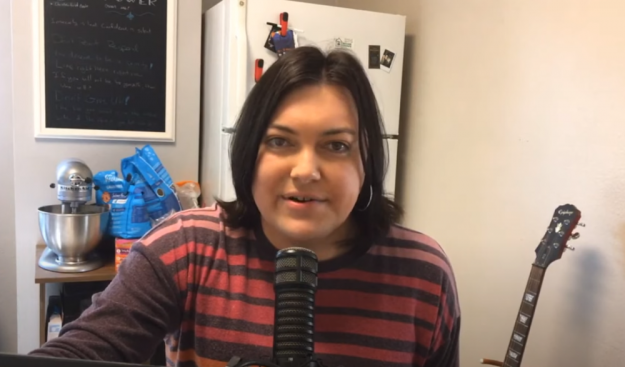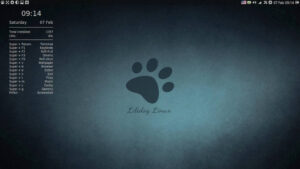With three full time employees and a robust community, Elementary OS went into this year as a Linux project that seemed to be on easy street. Today, it’s down to one employee, it’s funds are dwindling rapidly, but it still has an enthusiastic community and a determined leader with a particularly open source vision.

It seems that a business downturn at Elementary, Inc, the company behind the Elementary OS Linux distribution, has led to a partnership breakup, which puts one partner in sole custody of the company, hence the distro, with the other leaving to take a position at a commercial open source company.
Also gone is Elementary’s CFO, which means that the single owner is also now the only person running the company. That, along with the lack of funds, has some questioning whether the project can survive.
The story began unfolding in a March 7 thread on Twitter from Elementary’s co-founder, Danielle Foré, who basically said, “Houston, we have a problem.”
Elementary in a Nutshell
Until recently, Elementary OS (officially styled without an opening cap) was considered to be a rare financial success story in the world of desktop Linux. A commercial distro with strong community involvement, it’s been around for a little over a decade. During that time, it’s built a name for itself for being not only stable and easy-to-use (even for beginning Linux users), but also pleasing to the eye. It comes with its own Gnome-based desktop environment, Pantheon, which some users claim is one of the reasons for its success.
The organization sells the distro on a “pay what you can” basis, with $20 being the default price, although users are welcome to download and install the distro for free if they wish. In 2018, the cash flow created by this funding approach was given a boost by a a large donation from an anonymous source, further assuring the projects future.
The increased funding allowed an Elementary co-founder, Cassidy James Blaede, who had been working on Elementary on a volunteer basis in his spare time, to quit his day job as a UX Architect for Colorado-based System76 to work for the project full time.
“Thanks to the continued support from our community as well as a large private contribution, I now have the opportunity to do all of this full time as my career,” he announced on his blog at the time. “I plan to continue to focus on the areas I’ve been working on as a volunteer, plus dedicate time to working with OEMs, app developers, and other parties to help keep elementary financially sustainable.”
Elementary seemed poised to do what Ubuntu had attempted but failed: create a desktop Linux distribution that could pay its own way without a Daddy Warbucks to keep it afloat.
Pandemic Brings Financial Woes
Unknown to the greater open source community, at some time in the recent past, the good times at Elementary OS ended. The windfall donation was largely spent, and the project’s “pay what you can” income stream turned out to be unreliable in a time of global pandemic.
“[S]ales have really struggled since COVID hit and haven’t really recovered, so for quite a while now Elementary has been losing a significant amount of money,” Foré said in her Twitter thread. “We’ve been trying to figure out how to solve this, and you’ve probably seen more effort [from us] around the retail store, YouTube, etc., but the reality is that our budget is too large and needs to be trimmed.”
She said that salaries were the project’s biggest expense (the project’s two co-founders, along with the CFO, were collecting salaries), and that at sometime in the recent past a 5% pay cut was instituted that affected all three paychecks, which was at best a band-aid approach that would do little to rescue the organization from its financial troubles.
“We were supposed to have a meeting at the beginning of February to look at the budget again and probably make another cut,” Foré said. “I had been vocal that the cut should be to owner salaries, and I have been willing to tighten my personal budget to balance the company budget.”
That meeting never happened, however.
“The weekend before our meeting, Cassidy called me to let me know that he had accepted a full-time position somewhere else,” she said. “This took me totally off guard, and it sucked that it wasn’t discussed in any way, but I can’t totally blame someone for not being willing to cut their pay.”
For his part, Blaede said in a blog he posted on Thursday that he “had been keeping a casual ear to the ground for potential positions at open source companies” where he would be a good fit, and soon found “a perfect opportunity in open source and with existing friends and colleagues.”
“After confirming it would be an incredible fit while importantly allowing me to continue my work on Elementary,” he said, “I made the hard decision to cut back my hours at Elementary, eliminate my salary (freeing it up for other initiatives), and to take this position for my wage.”
That didn’t sit well with Foré, who said in her Twitter thread that after hearing that Blaede had taken a job outside of Elementary, that she “accepted it and said, ‘OK, we’ll figure out what a transition looks like. We’ll make sure you’re payed out for your shares. We’ll make sure you don’t have a gap in pay. Basically, you’ll be taken care of and we’ll part ways as friends. No hard feelings.’
“But Cass followed up later with an email that he didn’t want to give up his shares in the company,” she added. “He still wanted to be in control and make decisions, and to me, that’s not OK. Elementary has always been operated and controlled by the people who are doing the work. This led to a lot of arguing, and basically not only is there no way there could be an amicable business relationship, but there’s no way there could be a friendship here either. So I said, ‘Hey we need to figure this out and go our separate ways.'”
Negotiating Blaede’s Exit
According to Foré, she and Blaede quickly hammered out a handshake agreement.
“I offered an even split of the company’s assets,” she said. “One of us keeps the company and the other gets half of the money, which at that time was about $26,000. At about week three we seemed to agree that I would keep the company and Cass would take the money, so I went to get a purchase agreement put together by a lawyer to make it kosher so we could move on with peace of mind, etc.”
Like many many deals signed by a handshake, this one started to fall apart as soon as lawyers got involved.
“A few days later I get an email from Cassidy’s lawyer [saying] that he wants $30k now, $70k over the next 10 years, and to keep [a] 5% share [in the company],” she said. “I said, ‘Hey, this isn’t what we agreed to. We agreed to half.’ But she [Blaede’s lawyer] insists Cass didn’t agree to anything, and also that he should profit from any future sale of the company, etc.”
According to Foré, she stood her ground, and also engaged in a bit of bluff calling.
“I also said, if he thinks there’s $100k plus of value for his shares, etc., then please honor the original agreement and pay me the $26k and I will go on my way, because to me that’s what’s fair. I’m not going to be taken advantage of and saddled with this huge debt.”
We’ll probably never know the exact terms of the agreement that was finally reached. What we do know is that by last Thursday, when Blaede posted on his blog to announce his separation from the project, that some kind of agreement had been reached.
“I have decided that the best course of action is indeed for me to move on. I’m giving up on my decade-plus passion for Elementary, and have accepted an offer for Dani to be the sole, 100% owner of Elementary, Inc. I’ve signed my resignation and as of today, she now owns the entirety of the company shares and responsibility. I wish her the best in continuing its legacy,” he said.
“In line with Dani’s wishes, I will no longer be involved in any way at Elementary. Instead, I will focus my free-time efforts on contributing to Gnome, Flatpak, Flathub, and those growing ecosystems. In many ways, this will be a continuation of my work from Elementary where I was involved in Gnome hackfests and conferences, attended and spoke at the Linux App Summit, helped design and championed the cross-desktop dark style and accent colors, and worked on an open ecosystem of apps.”
With a parting nod, Blaede added, “I still largely agree with its current direction, and wish everyone involved the best.”
Elementary’s Future
On April 1, the day after Blaede posted his farewell blog, Foré spent about an hour on a YouTube livestream, giving something of a state-of-the-union address to members of the Elementary OS community, who are the de facto shareholders to whom she must answer now that she finds herself in complete control of the company responsible for Elementary OS’s development.
“As of now, I am the sole owner and only employee of Elementary, Inc.,” she said as she opened the talk, revealing that Liz Kecso, who had been Elementary’s CFO since January 2019, “decided to take another position while this stuff was happening.”
During the presentation, she was often pensive and reflective, especially when explaining the recent events that had led to the project’s current situation.
“The company, I think, ended up in the position that it did because of my failures in leadership and because I wasn’t loud enough about things,” she said. “I wasn’t directing things in a firm enough way. I want to take responsibility, ultimately, for how the company has conducted itself, because that is my responsibility, and it’s my responsibility to change it, to fix it, and to make it better.”
She said that her focus for the time being will be on Elementry OS 7, which will be based on Ubuntu 22.04, Canonical’s next long term support release which is scheduled to be ready for prime time on April 21.
“I want to still try to release OS7 as close as possible to that LTS release,” she said. “That means there’s some feature stuff that’s probably going to be scoped back. A lot of time was burned recently, so OS7 is probably going to be a more modest release to start with, but since it is an LTS cycle, that means we’ll have two years of basically continuous updates.”
Perhaps most revealing were the insights she gave into her vision of what the project and the company that guides it should strive to be going forward.
“I don’t care about having Elementary be some big company that takes over the world, and I don’t want to do stuff that’s pushed in that direction anymore,” she answered. “I just want to have fun and be more of a positive force in the broader open source community.”
“I want to completely give back more to everyone,” she added. “I feel like there’s been such a flow of energy that’s going into the company, and I want it to go the other way, if that makes sense.”
Great open source sentiments, but only time can tell how this will play out. One thing’s a certainty — Elementary’s looking at a tough year ahead.
Editor’s note: An earlier version of this article said that the amount of the large donation that Elementary received in 2018 was $1 million, which was an error. A $1 million dollar donation was received by Gnome at about the same time that Elementary received an undisclosed substantial but smaller donation.
Christine Hall has been a journalist since 1971. In 2001, she began writing a weekly consumer computer column and started covering Linux and FOSS in 2002 after making the switch to GNU/Linux. Follow her on Twitter: @BrideOfLinux











My opinion only… but… I shy away from any distro the pushes a “pay us $20.00 (or more)” dialogue into your face before you can download the distro. I did put $0.00 and managed to get the download. (Let me try before I buy.) I’m glad I tried it first. Once you have it installed, you get NO THEMES, not even a theme tab/icon in System Settings (you’re stuck with the bright white 60 watt glare THEY feel you should use). And you’re asking money for THIS?? And, finally, you get badgered for money every time you want to install a new app. This may be the reason for the fail. I settled on Linux Mint. No pushing the proverbial alms cup at you. LOTS of themes, including vision-saving darker ones.
Just look into the single/double click behaviour in Files (the file manager). That simple thing has pushed many to abandon Elementary or in the best case scenario to use Nemo or some other file manager.
Go through the discussions and commits in github and there are lots of frustrated developers and end users commenting about this.
And there are many more tiny details like this (minimize button, close button placement, etc).
One factual error. You referred to Daniel as a she but he’s a dude